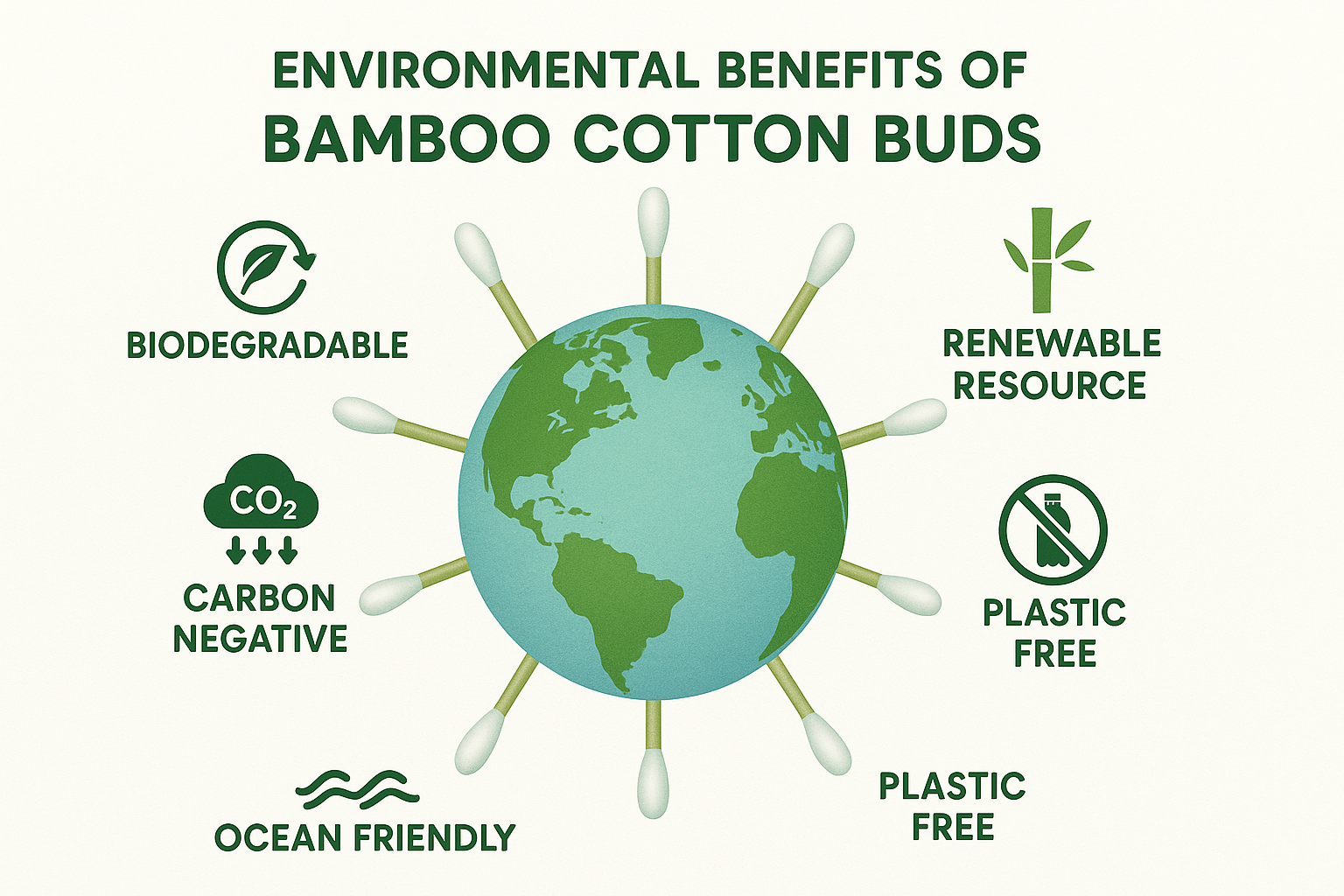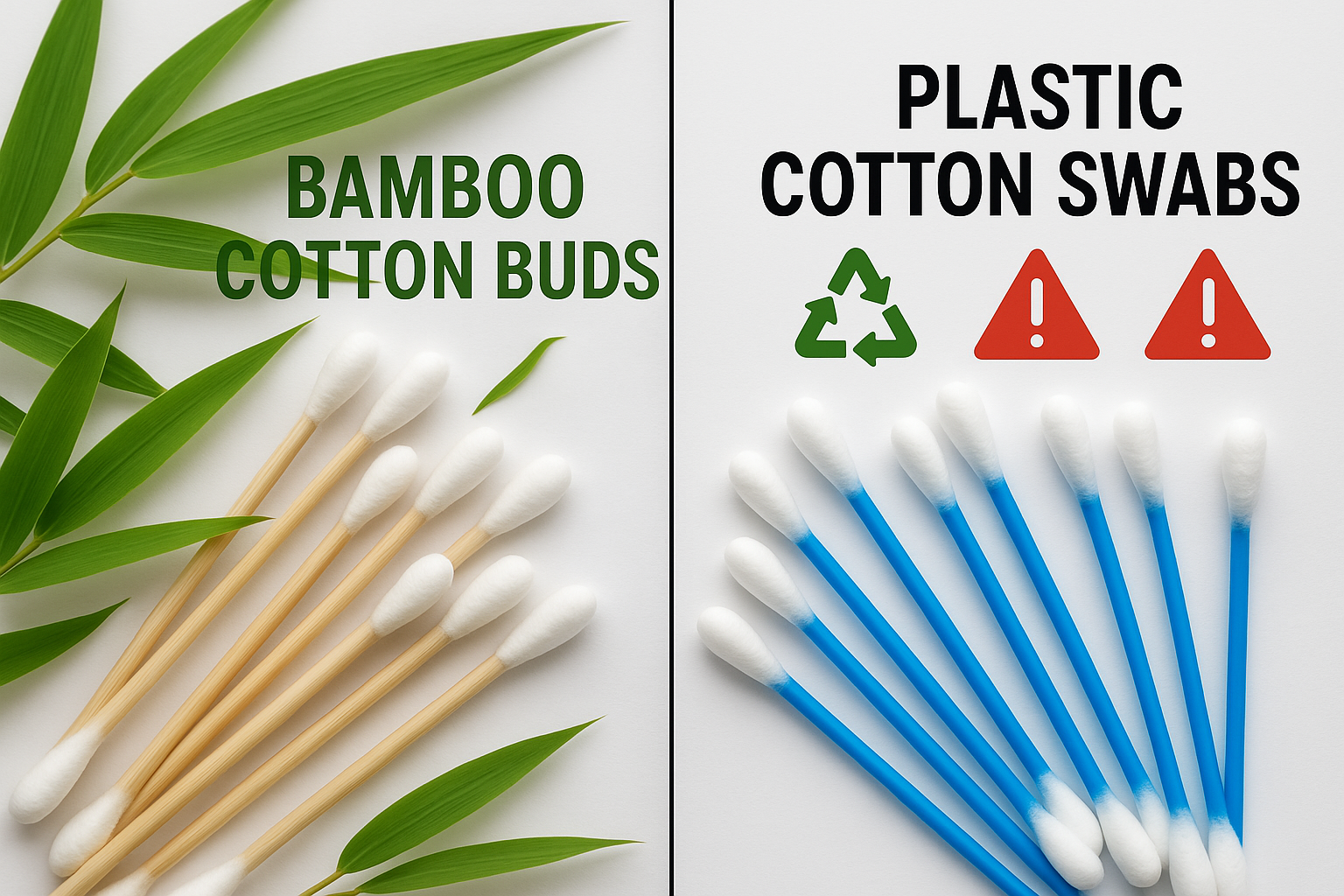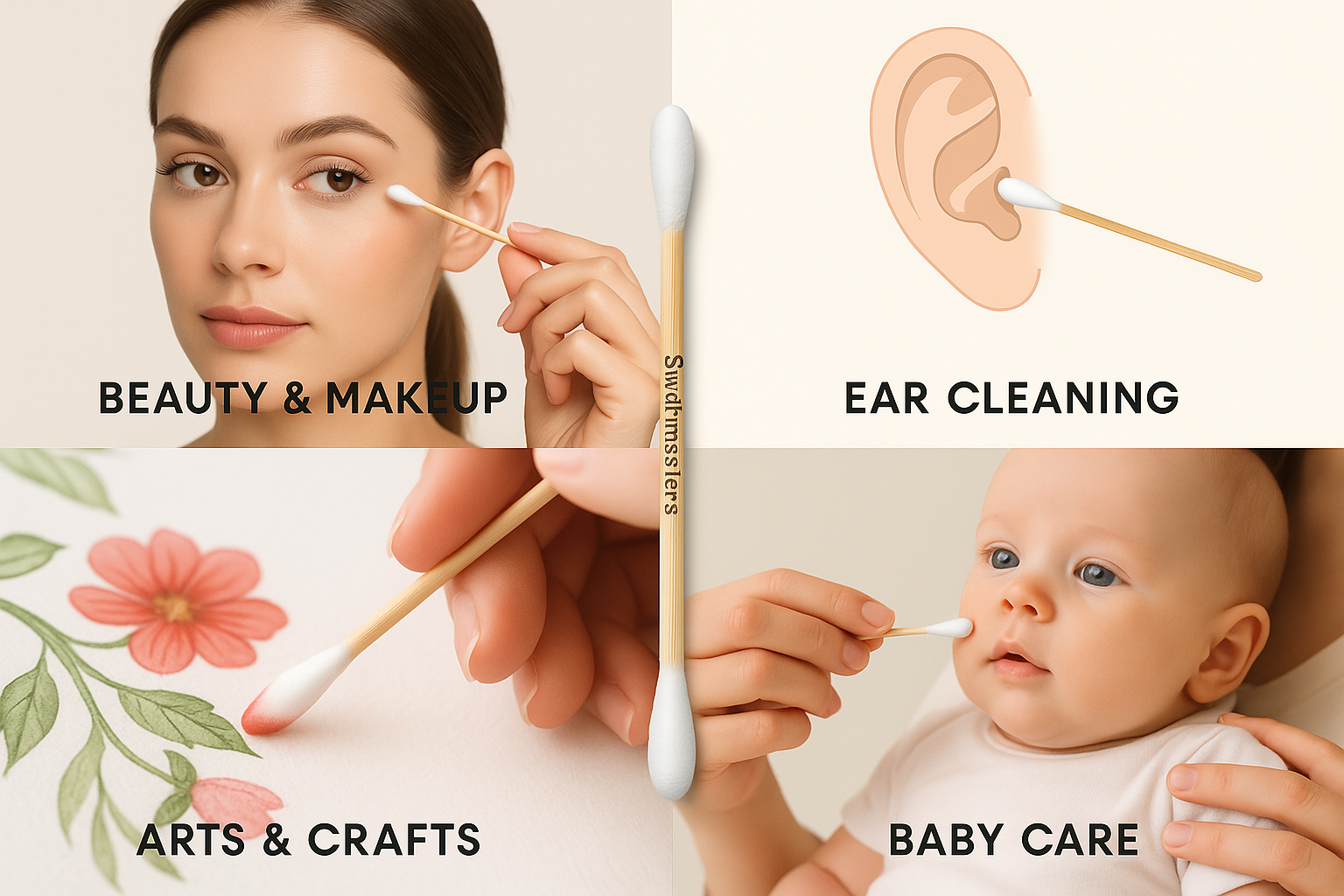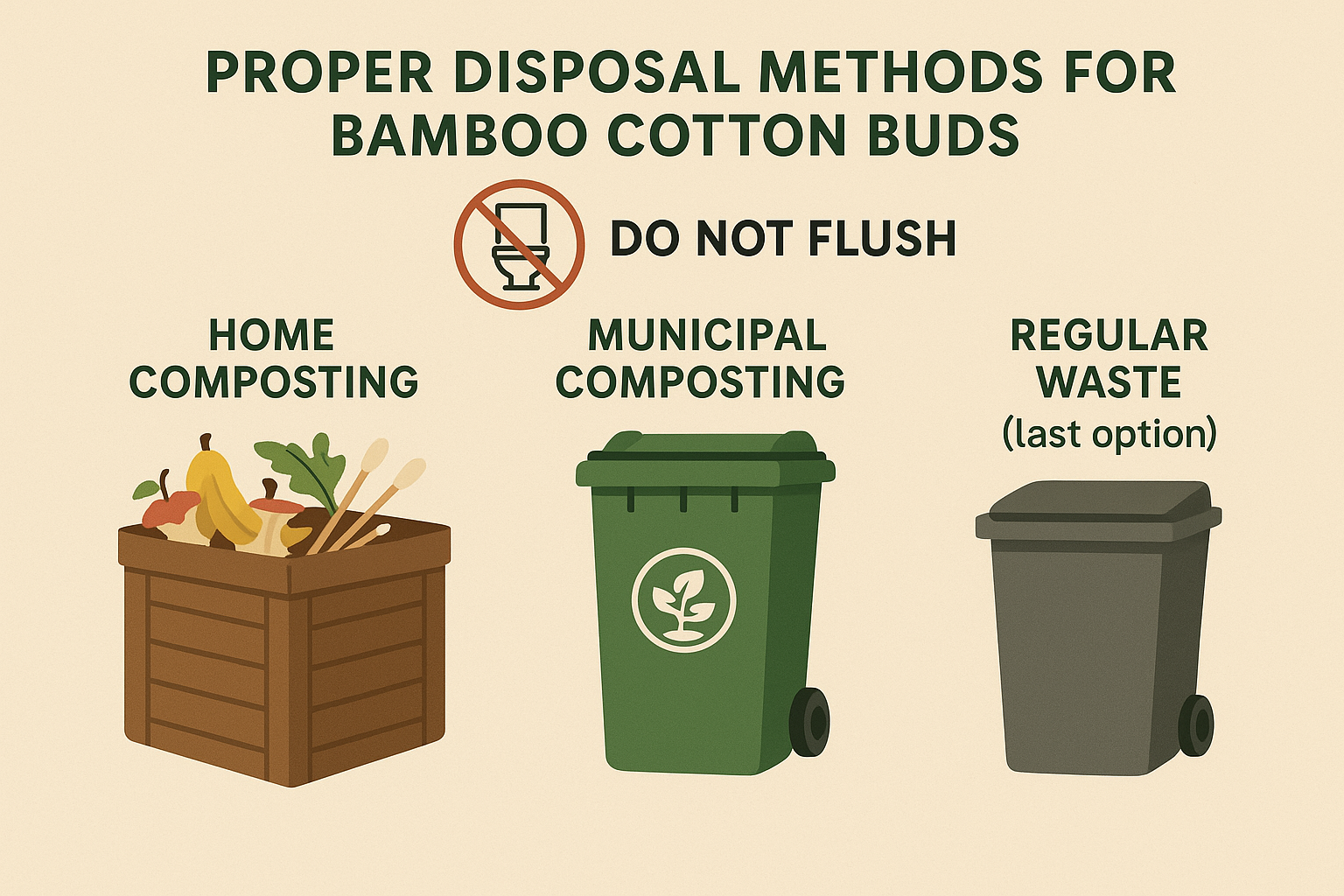Are bamboo cotton buds good? This question is becoming more important as people look for eco-friendly alternatives to everyday products. With plastic pollution harming our oceans and environment, many consumers are switching to sustainable options. Bamboo cotton buds offer a promising solution to replace traditional plastic cotton swabs.
In this complete guide, we will explore everything you need to know about bamboo cotton buds. You will learn how they are made, their benefits, and why they might be the perfect choice for your daily routine. We will also compare them with plastic alternatives and help you make an informed decision.
The shift toward sustainable living has made bamboo cotton buds increasingly popular. These eco-friendly alternatives promise the same functionality as traditional cotton swabs while reducing environmental impact. But do they really deliver on these promises?

Swabmasters Bamboo Cotton Buds – The sustainable choice for conscious consumers
Table of Contents
- What Are Bamboo Cotton Buds?
- How Are Bamboo Cotton Buds Made?
- Benefits of Bamboo Cotton Buds
- Bamboo vs Plastic Cotton Swabs Comparison
- How to Choose Quality Bamboo Cotton Buds
- Proper Use and Disposal Methods
- Frequently Asked Questions
- Conclusion
What Are Bamboo Cotton Buds?
Bamboo cotton buds are eco-friendly alternatives to traditional plastic cotton swabs. They consist of two main components: a bamboo stick and cotton tips on both ends. The bamboo stick replaces the plastic stem found in conventional cotton swabs.
These sustainable cotton swabs use bamboo as their core material because of its unique properties. Bamboo is one of the fastest-growing plants on Earth. It can grow up to three feet in just 24 hours and reaches maturity in three to five years. This rapid growth makes bamboo a highly renewable resource.
The cotton tips are typically made from 100% pure cotton or organic cotton that is free from harmful chemicals. The organic cotton is softer and safer for sensitive skin compared to conventional cotton. The combination of bamboo and organic cotton creates a product that is both functional and environmentally responsible.
Unlike plastic cotton swabs, bamboo cotton buds are completely biodegradable. When disposed of properly, they break down naturally without leaving harmful residues in the environment. This biodegradability is one of the key advantages that make bamboo cotton buds an attractive alternative.
The appearance of bamboo cotton buds is very similar to traditional cotton swabs. Most users cannot tell the difference in terms of functionality and ease of use. The bamboo stick provides the same level of firmness and control as plastic sticks, making the transition seamless for most people.
How Are Bamboo Cotton Buds Made?
Understanding the manufacturing process helps explain why bamboo cotton buds are considered more sustainable than plastic alternatives. The production involves several carefully controlled steps that ensure quality and environmental responsibility.

The 5-step manufacturing process of Swabmasters bamboo cotton buds
Step 1: Bamboo Harvesting
The process begins with sustainable bamboo harvesting. Manufacturers select mature bamboo stalks that are three to five years old. The harvesting method is crucial for sustainability. When bamboo is cut properly, the root system remains intact, allowing new shoots to grow quickly without replanting.
Bamboo harvesting does not require heavy machinery or cause soil erosion. The plant’s extensive root system actually helps prevent soil erosion and improves soil quality. This makes bamboo farming much more environmentally friendly than traditional tree harvesting.
Step 2: Bamboo Processing
After harvesting, the bamboo stalks undergo processing to create the cotton bud sticks. The outer layer of the bamboo is carefully stripped away to reveal the inner woody part. This inner section is then cut into smaller pieces that will become individual cotton bud sticks.
The bamboo pieces are shaped and smoothed to create uniform sticks. This shaping process ensures that each stick has the right diameter and length for comfortable use. Quality control during this stage is essential to maintain consistency across all products.
Step 3: Treatment and Strengthening
To enhance durability and resistance to moisture, the bamboo sticks undergo a treatment process. First, they are dried to reduce moisture content and prevent mold growth. This drying process is typically done using natural air drying or low-temperature heating.
Next, the bamboo sticks receive heat treatment to strengthen the fibers. This process involves heating the bamboo to specific temperatures that increase its resistance to damage and extend its shelf life. The heat treatment also deepens the natural color of the bamboo, giving it an attractive appearance.
Step 4: Cotton Tip Production ,Assembly and Packaging
The cotton tips are produced separately using 100% pure cotton or organic cotton that meets strict quality standards. The cotton is processed to create the familiar swab shape through mechanical processes that ensure uniformity and softness. The organic cotton is free from pesticides, bleaches, and other harmful chemicals.
The cotton tips are designed to be absorbent and gentle on the skin. The manufacturing process maintains the natural properties of cotton while creating the right density and shape for effective use. Quality testing ensures that the cotton tips meet safety and performance standards.
The assembly process ensures that the cotton tips are securely attached and will not come off during normal use.
After assembly, the bamboo cotton buds are packaged using environmentally friendly materials. Many manufacturers use recycled paper or biodegradable packaging to maintain the eco-friendly nature of the product. The packaging often includes information about proper disposal and environmental benefits.
Benefits of Bamboo Cotton Buds
Bamboo cotton buds offer numerous advantages over traditional plastic cotton swabs. These benefits span environmental, health, and practical considerations that make them an excellent choice for conscious consumers.
Environmental Benefits
The most significant advantage of bamboo cotton buds is their positive environmental impact. Unlike plastic cotton swabs that can persist in the environment for hundreds of years, bamboo cotton buds are completely biodegradable. When disposed of properly, they break down naturally within months, leaving no harmful residues.

Key environmental advantages of choosing bamboo cotton buds over plastic alternatives
Bamboo is one of the most sustainable materials available. It produces 35% more oxygen than equivalent stands of trees and absorbs more carbon dioxide from the atmosphere. This makes bamboo cotton buds carbon-negative products that actually help combat climate change.
The production of bamboo cotton buds requires significantly less water and energy compared to plastic alternatives. Bamboo grows naturally without the need for pesticides, fertilizers, or irrigation in most climates. This reduces the overall environmental footprint of the manufacturing process.
Ocean pollution is a major concern with plastic cotton swabs. These products are frequently found in marine environments where they harm wildlife and contribute to the growing problem of plastic pollution. Bamboo cotton buds eliminate this risk because they decompose naturally if they accidentally enter waterways.
Health and Safety Benefits
Bamboo cotton buds offer several health advantages over plastic alternatives. The bamboo material has natural antimicrobial properties that help inhibit the growth of bacteria and fungi. This reduces the risk of infections or irritations that might occur with contaminated cotton swabs.
The organic cotton used in bamboo cotton buds is free from harmful chemicals such as bleaches, dyes, and pesticides. This makes them safer for people with sensitive skin or allergies. The absence of chemical treatments also means there are no toxic fumes or residues that could cause health problems.
Bamboo cotton buds are hypoallergenic and gentle on the skin. The smooth bamboo surface and soft organic cotton tips provide a comfortable experience without causing irritation. This makes them suitable for all family members, including children and elderly individuals with delicate skin.
Unlike some plastic cotton swabs that may contain BPA or phthalates, bamboo cotton buds are completely free from these potentially harmful chemicals. This eliminates concerns about chemical exposure during use, especially for sensitive applications like ear cleaning or makeup removal.
Practical and Performance Benefits
From a practical standpoint, bamboo cotton buds perform just as well as plastic alternatives. The bamboo stick provides excellent firmness and control, allowing for precise application in various uses. Users typically cannot detect any difference in functionality between bamboo and plastic cotton swabs.
Bamboo cotton buds are surprisingly durable despite being made from natural materials. The heat treatment process strengthens the bamboo fibers, making them resistant to breaking or bending during normal use. This durability ensures that they can handle various applications without compromising performance.
The versatility of bamboo cotton buds makes them suitable for multiple purposes. They work excellently for ear cleaning, makeup application and removal, nail art, household cleaning tasks, arts and crafts projects, and pet care. This multi-purpose functionality provides excellent value for consumers.
Storage and shelf life are also advantages of bamboo cotton buds. When stored in dry conditions, they maintain their quality for extended periods without degradation. The natural properties of bamboo help resist moisture and prevent the growth of mold or bacteria during storage.
Economic Considerations
While bamboo cotton buds may have a slightly higher upfront cost compared to plastic alternatives, they offer excellent long-term value. The durability and multi-purpose nature of these products mean that consumers often need fewer units to accomplish the same tasks.
The growing demand for sustainable products has led to increased production and competition in the bamboo cotton bud market. This has resulted in more competitive pricing and better availability for consumers. Many retailers now offer bamboo cotton buds at prices comparable to premium plastic alternatives.
From a broader economic perspective, choosing bamboo cotton buds supports sustainable industries and farming practices. This helps create jobs in environmentally responsible sectors while reducing dependence on petroleum-based plastic products. The economic benefits extend beyond individual consumers to support sustainable development goals.
Bamboo Cotton Buds vs Plastic Cotton Swabs: A Detailed Comparison
Understanding the differences between bamboo cotton buds and traditional plastic cotton swabs helps consumers make informed decisions. This comparison examines key factors including environmental impact, performance, cost, and safety considerations.

Visual comparison between eco-friendly bamboo cotton buds and traditional plastic cotton swabs
Environmental Impact Comparison
The environmental differences between bamboo and plastic cotton swabs are substantial. Plastic cotton swabs are made from petroleum-based materials that require significant energy and resources to produce. The manufacturing process releases greenhouse gases and contributes to air pollution.
Plastic cotton swabs persist in the environment for 200-500 years after disposal. They do not biodegrade naturally and often end up in landfills or marine environments. Ocean currents carry plastic cotton swabs to remote areas where they harm marine life and contribute to the formation of garbage patches.
In contrast, bamboo cotton buds decompose naturally within 6-12 months when disposed of properly. They can be composted at home or in commercial composting facilities. Even if they accidentally enter natural environments, they break down without causing long-term harm to ecosystems.
The carbon footprint of bamboo cotton buds is significantly lower than plastic alternatives. Bamboo absorbs carbon dioxide during growth, making the overall product carbon-negative. Plastic production, on the other hand, releases stored carbon and contributes to greenhouse gas emissions.
Performance and Functionality
Both bamboo and plastic cotton swabs provide similar functionality for most applications. The firmness and control offered by bamboo sticks are comparable to plastic sticks. Users can perform the same tasks with equal precision and effectiveness.
Bamboo cotton buds may have a slight advantage in terms of grip and comfort. The natural texture of bamboo provides better grip, especially when hands are wet or slippery. This can be particularly beneficial during makeup application or detailed cleaning tasks.
The absorbency and softness of the cotton tips are identical in both types of cotton swabs, assuming the same quality of cotton is used. The performance difference lies primarily in the stick material rather than the cotton components.
Some users report that bamboo cotton buds feel more substantial and premium compared to plastic alternatives. The natural weight and texture of bamboo can provide a more satisfying user experience, though this is largely a matter of personal preference.
Cost Analysis
The initial purchase price of bamboo cotton buds is typically lightly higher than plastic alternatives. However, this price difference has been decreasing as production scales up and competition increases in the sustainable products market.
When considering long-term costs, bamboo cotton buds often provide better value. Their durability means fewer units are needed for the same tasks. Additionally, the multi-purpose nature of bamboo cotton buds can reduce the need for other cleaning or application tools.
The hidden costs of plastic cotton swabs include environmental cleanup, healthcare costs related to pollution, and the long-term impact on ecosystems. While these costs are not directly paid by consumers, they represent significant societal expenses that make plastic alternatives more expensive from a total cost perspective.
Bulk purchasing options for bamboo cotton buds have become more available, allowing consumers to achieve better per-unit pricing. Many online retailers and eco-friendly stores offer competitive pricing for larger quantities.
Safety and Health Considerations
Bamboo cotton buds have several safety advantages over plastic alternatives. The natural antimicrobial properties of bamboo help prevent bacterial growth on the stick surface. This reduces the risk of introducing harmful bacteria during use.
Plastic cotton swabs may contain chemical additives such as plasticizers, colorants, or stabilizers. While these are generally considered safe in small quantities, some individuals may be sensitive to these chemicals. Bamboo cotton buds eliminate this concern by using only natural materials.
The biodegradable nature of bamboo cotton buds also provides safety benefits for households with small children or pets. If accidentally ingested, bamboo materials are less likely to cause serious harm compared to plastic components that could cause blockages or chemical exposure.
Quality control standards for bamboo cotton buds are often higher than for plastic alternatives. Many manufacturers of bamboo products focus on premium quality and safety, resulting in more rigorous testing and quality assurance processes.
Disposal and End-of-Life Considerations
The disposal methods for bamboo and plastic cotton swabs are fundamentally different. Plastic cotton swabs must be disposed of in regular trash and will persist in landfills indefinitely. They cannot be recycled due to their small size and mixed materials.
Bamboo cotton buds can be composted in home composting systems or municipal composting facilities. The bamboo stick and organic cotton both break down naturally, contributing nutrients to the soil. This creates a circular economy where waste becomes a resource for new growth.
Even when disposed of in regular trash, bamboo cotton buds will eventually decompose in landfills, though this process may take longer due to limited oxygen and moisture. This is still preferable to plastic alternatives that remain unchanged for centuries.
The packaging of bamboo cotton buds is typically more environmentally friendly as well. Many manufacturers use recycled paper, cardboard, or biodegradable materials for packaging, further reducing the overall environmental impact of the product.
How to Choose Quality Bamboo Cotton Buds
Selecting high-quality bamboo cotton buds ensures you get the best performance and environmental benefits. Several factors should be considered when making your purchase decision.
Key Features to Look For
The quality of bamboo used in the sticks is crucial for performance and durability. Look for products that specify the type of bamboo used and mention heat treatment or processing methods. High-quality bamboo sticks should be smooth, uniform in diameter, and free from splinters or rough edges.
Organic cotton tips are preferable to conventional cotton. Organic cotton is grown without pesticides or harmful chemicals, making it safer for sensitive skin and better for the environment. The cotton should be tightly wound and securely attached to the bamboo stick.
Packaging materials provide insights into the manufacturer’s commitment to sustainability. Look for products packaged in recycled paper, cardboard, or biodegradable materials. Avoid products with excessive plastic packaging, as this contradicts the environmental benefits of bamboo cotton buds.
Certifications and standards can help identify quality products. Look for certifications such as organic cotton certification, sustainable bamboo certification, or eco-friendly product standards. These certifications indicate that the product meets specific quality and environmental criteria.
Brand Reputation and Reviews
Research the manufacturer’s reputation and commitment to sustainability. Companies that specialize in eco-friendly products often have higher quality standards and better environmental practices. Read customer reviews to understand real-world performance and satisfaction levels.
Look for brands that provide detailed information about their manufacturing processes and sourcing practices. Transparent companies are more likely to produce high-quality products and maintain ethical business practices.
Consider the company’s overall product range and environmental mission. Brands that offer multiple sustainable products often have more experience and expertise in eco-friendly manufacturing.
Price and Value Considerations
While price is important, focus on value rather than just the lowest cost. Higher-quality bamboo cotton buds may cost more initially but often provide better performance and durability. Calculate the cost per unit to make fair comparisons between different brands and package sizes.
Bulk purchasing options can provide significant savings for regular users. Many manufacturers offer larger packages or subscription services that reduce the per-unit cost while ensuring a steady supply of products.
Consider the total value proposition including environmental benefits, health advantages, and performance. The slightly higher cost of bamboo cotton buds is often justified by their superior sustainability and safety profile.
Proper Use and Disposal Methods
Using bamboo cotton buds correctly ensures optimal performance and safety. Following proper disposal methods maximizes their environmental benefits.
Safe Usage Guidelines
Bamboo cotton buds can be used for the same applications as traditional cotton swabs. For ear cleaning, gently clean only the outer ear canal and avoid inserting the cotton bud too deeply. The firmness of bamboo sticks provides good control for precise cleaning.

Versatile applications of Swabmasters bamboo cotton buds: beauty, ear care, arts & crafts, and baby care
For makeup application and removal, bamboo cotton buds work excellently for detailed work around the eyes and lips. The organic cotton tips are gentle on sensitive skin and provide good absorption for makeup removal products.
When using bamboo cotton buds for household cleaning or arts and crafts, take advantage of their durability and precision. The bamboo stick can handle more pressure than plastic alternatives without breaking or bending.
Store bamboo cotton buds in a dry location to maintain their quality and prevent moisture absorption. Most bamboo cotton buds come in resealable packaging that helps maintain freshness and prevents contamination.
Environmental Disposal Methods
The best disposal method for bamboo cotton buds is home composting. Both the bamboo stick and organic cotton will decompose naturally in a compost pile. Cut or break the cotton buds into smaller pieces to speed up the decomposition process.

Eco-friendly disposal options for bamboo cotton buds: composting preferred, regular waste as last resort
If home composting is not available, check for municipal composting programs in your area. Many cities now accept compostable materials including bamboo products. Contact your local waste management authority for specific guidelines.
When composting is not an option, dispose of bamboo cotton buds in regular household waste. While they will decompose more slowly in landfills, they will eventually break down unlike plastic alternatives.
Avoid flushing bamboo cotton buds down toilets or drains. While they are biodegradable, they can cause blockages in plumbing systems and should be disposed of through proper waste channels.
Common Mistakes to Avoid
Do not assume all bamboo cotton buds are created equal. Quality varies significantly between manufacturers, so research products before purchasing. Cheap alternatives may use lower-quality bamboo or conventional cotton that reduces the environmental and health benefits.
Avoid storing bamboo cotton buds in humid environments such as bathrooms without proper ventilation. Moisture can cause the bamboo to warp or develop mold, reducing the product’s effectiveness and safety.
Do not use bamboo cotton buds for applications that require sterile conditions unless they are specifically labeled as sterile. While bamboo has natural antimicrobial properties, it may not meet medical sterility standards for certain applications.
Resist the temptation to reuse bamboo cotton buds for hygiene applications. While they are durable enough for reuse in some applications, hygiene products should be used once and disposed of properly to prevent contamination.
Frequently Asked Questions About Bamboo Cotton Buds
Are bamboo cotton buds more expensive than plastic ones?
Bamboo cotton buds typically cost lightly more than plastic alternatives initially. However, their durability and multi-purpose functionality often provide better long-term value. The price difference has been decreasing as production scales up and more brands enter the market.
Do bamboo cotton buds work as well as plastic cotton swabs?
Yes, bamboo cotton buds perform just as well as plastic cotton swabs for all common applications. The bamboo stick provides similar firmness and control, while the organic cotton tips offer the same absorbency and softness. Most users cannot detect any functional difference between the two types.
How long do bamboo cotton buds take to decompose?
Bamboo cotton buds typically decompose within 6-12 months when composted properly. In natural environments, they break down within 1-2 years depending on conditions. This is significantly faster than plastic cotton swabs, which can persist for 200-500 years.
Are bamboo cotton buds safe for children?
Bamboo cotton buds are generally safer for children than plastic alternatives. They contain no harmful chemicals and have natural antimicrobial properties. However, adult supervision is still recommended when children use any cotton swabs, regardless of the material.
Can bamboo cotton buds be recycled?
Bamboo cotton buds cannot be recycled through traditional recycling programs due to their small size and mixed materials. However, they can be composted, which is a better end-of-life option than recycling. Composting returns nutrients to the soil and completes the natural cycle.
Where can I buy quality bamboo cotton buds?
Quality bamboo cotton buds are available at health food stores, eco-friendly retailers, and online marketplaces. Look for brands that specialize in sustainable products and provide detailed information about their manufacturing processes and certifications.
Do bamboo cotton buds have any disadvantages?
The main disadvantages of bamboo cotton buds are slightly higher cost and limited availability compared to plastic alternatives. Some users may need time to adjust to the different feel of bamboo sticks. However, these minor drawbacks are outweighed by the significant environmental and health benefits.
Are all bamboo cotton buds biodegradable?
Most bamboo cotton buds are biodegradable, but quality varies between manufacturers. Look for products that specify organic cotton and natural bamboo without chemical treatments. Avoid products with plastic packaging or synthetic adhesives that may reduce biodegradability.
Conclusion: Making the Switch to Bamboo Cotton Buds
The evidence clearly shows that bamboo cotton buds are a superior alternative to traditional plastic cotton swabs. They offer the same functionality and performance while providing significant environmental and health benefits. The biodegradable nature of bamboo cotton buds addresses the growing problem of plastic pollution without compromising on quality or convenience.
The manufacturing process of bamboo cotton buds demonstrates a commitment to sustainability from raw material sourcing through final packaging. The use of rapidly renewable bamboo and organic cotton creates products that are both effective and environmentally responsible.
From a health perspective, bamboo cotton buds eliminate concerns about chemical exposure while providing natural antimicrobial properties. The absence of harmful additives makes them suitable for all family members, including those with sensitive skin or allergies.
The economic considerations favor bamboo cotton buds when viewed from a long-term perspective. While the initial cost may be slightly higher, the durability, versatility, and environmental benefits provide excellent value. The growing availability and competitive pricing make bamboo cotton buds an accessible choice for most consumers.
Making the switch to bamboo cotton buds is a simple yet meaningful step toward more sustainable living. This small change in daily routine contributes to reducing plastic waste, supporting sustainable agriculture, and protecting environmental health. As consumer demand for eco-friendly products continues to grow, bamboo cotton buds represent the future of personal care products.
For those ready to make the switch, start by trying a small package of quality bamboo cotton buds. Experience the difference in performance and feel good about making an environmentally responsible choice. Your ears, your health, and the planet will thank you for choosing bamboo cotton buds over plastic alternatives.
The question “Are bamboo cotton buds good?” has a clear answer: Yes, they are not only good but superior to plastic alternatives in almost every way that matters. The time to make the switch is now, and the benefits extend far beyond individual use to create positive impacts for our shared environment and future generations.
This article was created to help consumers make informed decisions about sustainable personal care products. For high-quality bamboo cotton buds and other eco-friendly alternatives, visit Swab Masters for a wide selection of sustainable cotton swabs and related products.


